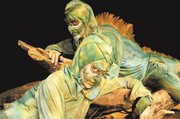Edward Albee won the 1975 Pulitzer Prize in Drama (one of three he’s pulled down) for a four-person play exploring the evolution of both personal relationships and species. Well, it's not quite a “four-person” play because two of the characters aren’t human. They are some sort of lizard-like sea creatures who have emerged from the salty broth to try living on land.
Darwin tells us that once upon a time there must have been many individuals of sea-species that made that adventurous evolutionary leap at one time. But they would not have encountered an English-speaking human couple who are about-to-retire. It is the unique capacity of theater to spin such a story right in front of your eyes and the unique skill of Edward Albee to make all four of the individuals — reptilian and mamalian — interesting and identifiably individual.
The American Century Theater is reviving Albee’s unique play, “Seascape” in Theater II of Arlington’s Gunston Arts Center. Under director Steven Scott Mazzola, Annie Houston and Craig Miller take on the roles of the human couple who are in the midst of their own life-change as they approach retirement, and Brian Crane and Mundy Spears have donned costumes with huge swinging tails as the other “individuals.”
Together, they explore not just the issues Albee raises but the unique flights of language that are a hallmark of any play by the author of “Who’s Afraid of Virginia Woolf,” “A Delicate Balance” and “The Goat, or Who Is Sylvia?”
The humans don’t meet the reptiles until late in the first act. The bulk of that act is devoted to the human couple’s debate among themselves over what their life together should be like as the husband retires from employment and the wife no longer has her life dominated by child rearing duties. These two may have been enjoying a successful marriage in the past but they are at a key moment in the evolution of their relationship and are deep in argument over their future. He believes that they have “earned some rest” while she is anxious to find fulfillment in an adventurous future, perhaps traveling the world to always be living at a warm beach.
Albee uses these divergent views to raise questions about the purpose of life and the role of partnership in the mating ritual that is marriage. As is so often the case with Albee, however, he doesn’t offer answers. Draw your own conclusions and relate them to your own existence.
With the arrival of the lizard-like couple (who, somehow, are quite fluent in English) the focus of the discussions widen to embrace great issues of the meaning of life itself. With specific questions going all the way from the meaning of “love” to the origin of the ritual of shaking hands, the text is full of typically stimulating Albee-isms.
The human pair has more complex complications than do the reptiles, and Houston and Miller do a good job of delineating them, although Houston’s character’s harping on her disappointments in her mate are a bit hard to take.
Crane and Spears avoid playing the reptilian couple for laughs, although they don’t quite appear as “emotionless” as the dialogue seems to imply they should be. That is not to say, however, that they don’t get their fair share of laughs with Albee’s wit. Exploring everything from the sex organs of mammals to reptilian reproduction with its thousands of eggs as opposed to the human’s conception of three offspring, the discussions are intriguing.
Melanie Clark designed the costumes for the reptiles and Lynn Sharp-Spears the makeup. Together they found a way to have the reptiles not look like humans with green coloring but very acceptable as creatures from a pre-historic (by eons) age.
***
Brad Hathaway reviews theater in Virginia, Washington and Maryland as well as Broadway, and edits Potomac Stages, a Web site covering theater in the region (www.PotomacStages.com). He can be reached at Brad@PotomacStages.com.
